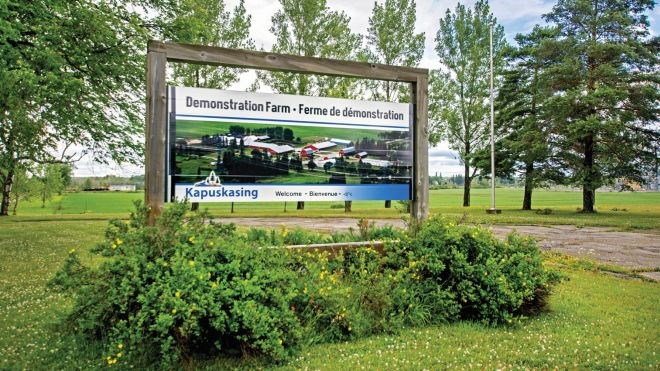All along the Clay Belt, fertile lands and affordable land prices are attracting new and veteran producers who want to make a living in agriculture. The Town of Kapuskasing has taken notice, making the agriculture industry the cornerstone of its economic development plan.
“There’s a lot of opportunity for agriculture in the North because our land is still relatively cheap compared to southern Ontario,” says André Robichaud, Kapuskasing’s economic development officer.
Key to the town’s strategy is the former Kapuskasing Beef Research Farm, which the town acquired from the federal government in March, 2015. Since then, the farm has been injected with new life as a producing farm and applied research centre.
After relocating to Kapuskasing from southern Ontario, farmer Andrew Gordanier has leased a portion of the farm and is raising livestock on site. Selling meat under the Kapuskasing Meats banner, right from the farm, has been wildly successful in its first year.
“Today, there are over 1,000 animals on site,” Robichaud says. “There are beef cows, calves, pork, sheep, chickens, and there’s some applied research going on at the farm.”
Milk from the sheep is being used by the local cheese factory, Fromagerie Kapuskoise, to create sheep’s cheese, and another portion of the site has been rented to grow hops.
A full 90 per cent of the site has been rented out, and the town has plans for the remaining 10 per cent, which comprises the site’s office buildings.
“We see that as a business incubator for agriculture going forward,” Robichaud says.
The 5,000-square-foot space is divided into seven individual offices and includes a large boardroom, reception area, and a fully equipped lab in the basement. It’s ideally suited for agri-food startups, agriculture-related organizations or other small businesses, and visitors have been showing interest.
“We would offer the internet and telephone, we would offer the office equipment, the boardroom, you name it,” Robichaud says. “They can just basically come in, rent some space, and they’re off and ready to go.”
On March 30-31, 2017, Kapuskasing will host agricultural producers and organizations for Growing the North, an agricultural symposium organized by the Northeast Community Network.
At the last iteration of the event in 2013, more than 150 attended to hear guest speakers, network, and share best practices. Robichaud expects those numbers to increase in 2017.
But agriculture isn’t all that’s going on in Kapuskasing.
At the airport’s business park, CannAssist has proposed building a 30,000-square-foot medical marijuana production facility, which, if approved, would bring 40 well-paying jobs to the region. CannAssist is currently awaiting approval from government regulators.
A new hangar is also in the works, and “right now, we have funding applications at both levels of senior government, so we’re waiting for approval,” Robichaud says.
In September, the town successfully celebrated the 2016 Growing Together Youth Gathering, which brings together high school-aged Indigenous and non-Indigenous youth to encourage understanding between the two cultures.
Robichaud said the town believes strongly in developing relationships at a young age to lay the groundwork for respectful partnerships.
“It’s part of the Town of Kapuskasing’s priorities to build and foster relationships with our neighbouring First Nations, and that’s one of the strategic initiatives that we put together four years ago,” Robichaud says.
Keeping the town’s foundation strong is the Tembec sawmill, which remains the town’s largest employer, with 575 employees across its divisions: the newsprint mill, sawmill and wood chip operation, and forest resource management group
As employees retire over the next five years, the company will be hiring, meaning quality paying jobs for a new generation of Northerners.
Énergie Kapuskasing Energy continues to develop renewable energy agreements with neighbouring communities. They currently have 67 projects in various phases throughout the province of Ontario. Between 2012 and 2014, the initiative saved 207 tonnes of carbon, generated 1.22 gigawatt hours of energy, and generated $780,000 in revenue for its partners.
Such a diversified portfolio of projects positions Kapuskasing for more growth and success in the coming years.




